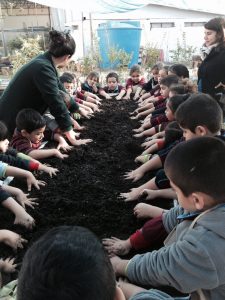How Necessary it is to Include Environmental Education In Schools?
For this international day of environmental education our team at Plastic Oceans Chile invited experts to give their vision on this important subject. In this occasion Natalia Fuentes Cabrera, Manager of the “Ecologearte” Environmental Education Program (@ecologearte), of the Isidora Zegers de Huneeus Educational Foundation (link), tells us about her experience with environmental education and the reality that she sees daily at the school where works.

Neighbourhood in la Pintana
A long time ago, I asked myself how necessary it is to include environmental education (or sustainability) in kindergartens, schools and high schools with limited resources in Chile.
Although the other subjects are fundamental for the academic development of the students, it should be emphasized that caring for the environment is also fundamental. Educating boys and girls who are experts in grammar, mathematical operations or the history of our country is as valuable as creating conscious children who value and protect the planet. Who know best their needs and their role as active citizens and make them responsible for this topic.
Why only in vulnerable educational centers?
For decades there has been the gap between the municipal (public) and the private sector, what is of quality and what is not, the gigantic differences between academic opportunities, from early age to undergraduate. Therefore, it is that the word “vulnerable” echoes how fragile, weak, defenseless or even abandoned some educational centers in our country are. Naturalizing this condition for the students who are part of this system.
However, none of the above is a excuse to take away the opportunity to learn something as remarkable as Environmental Education.
Children in situations of vulnerability have the same rights as any other child in the world, yearning for the same wishes, enjoying the same games, fulfilling the same stages of development step by step as any other child at school in our country.
In other words, it is urgent to nurture the lives of children in vulnerable situations during their development, contributing to the importance of valuing the environment that surrounds them. In this way, they will grow up being reflective of the role that each individual plays within their environment. And not looking away from his care and responsibility.
In many situations at work, I can hear how my students recognize what must be done, but they do not do it because they don’t want to disengage from groups of friends, lose leadership, or simply do a positive act for the planet. In other words, they clearly identify what to do for the planet, but they see it as something unnecessary for their lives, not understanding that these small actions could improve their own quality of life and that of their families.
Why does this happen?
Culturally, education has emphasized core subjects such as; Language, Mathematics, History and Sciences, where in each one of them you could find a brushstroke that refers to the care and appreciation for the environment, especially in the subject of Sciences.
We have been educated that the grade will always be more important than the learning process, that the test will be better than an experience of teamwork and therefore, that caring for the planet will always be small children’s things.

Educación Ambiental Colegio Jorge Huneeus en La Pintana.
Then, the family is convinced that reducing energy or water consumption, that reducing and recycling, that making gardens inside the houses is something only a hobby, fashion or extra work, not giving it the necessary return that allows them to understand that such minimal actions can optimize their lifestyles.
After all, we must rethink the lack of environmental culture and work for it. Inside and outside an educational establishment. Think about the benefit and opportunity that the student and his family will have as well as an entire educational community. Expanding knowledge, activating your senses, inquiring about the unknown and reflecting on your own actions.
Therefore, providing environmental education to children in vulnerable situations will allow them to be trained as critical people of the environment in which they live, despite the adversities of their environment. They will be able to understand that it is not possible to play in a pasture or garbage dump, given the bad pollution conditions, they will be able to visualize from a young age the need for green areas for their cognitive and motor development, they will know the importance of clean energy or they will simply know the importance of having a recycling center close to their home and use it!!
…… Finally, they will be boys and girls who will not settle for the life that many other children have to lead …
WATCH EARTH’S EKKO, OUR ANIMATED FILM FOR KIDS AGED 5 TO 12 YEARS OLD
PLEASE CONSIDER DONATING TO SUPPORT OUR EFFORTS TO PROTECT OUR WORLD.

Trackback: i9bet คาสิโนออนไลน์
Trackback: ราคาแทงบอลคืออะไร มีอะไรบ้าง
Trackback: https://stealthex.io
Trackback: จอ led ขนาดใหญ่
Trackback: ร้านเค้กวันเกิดใกล้ฉัน
Trackback: มาชัวร์เบท เว็บแทงหวยครบวงจร
Trackback: คาสิโนออนไลน์เว็บตรง ไม่ผ่านเอเย่นต์
Trackback: live cams
Trackback: คาสิโนออนไลน์ เกมทำเงิน 24 ชั่วโมง
Trackback: สล็อต888 วอเลท
Trackback: cam sites
Trackback: stapelstein